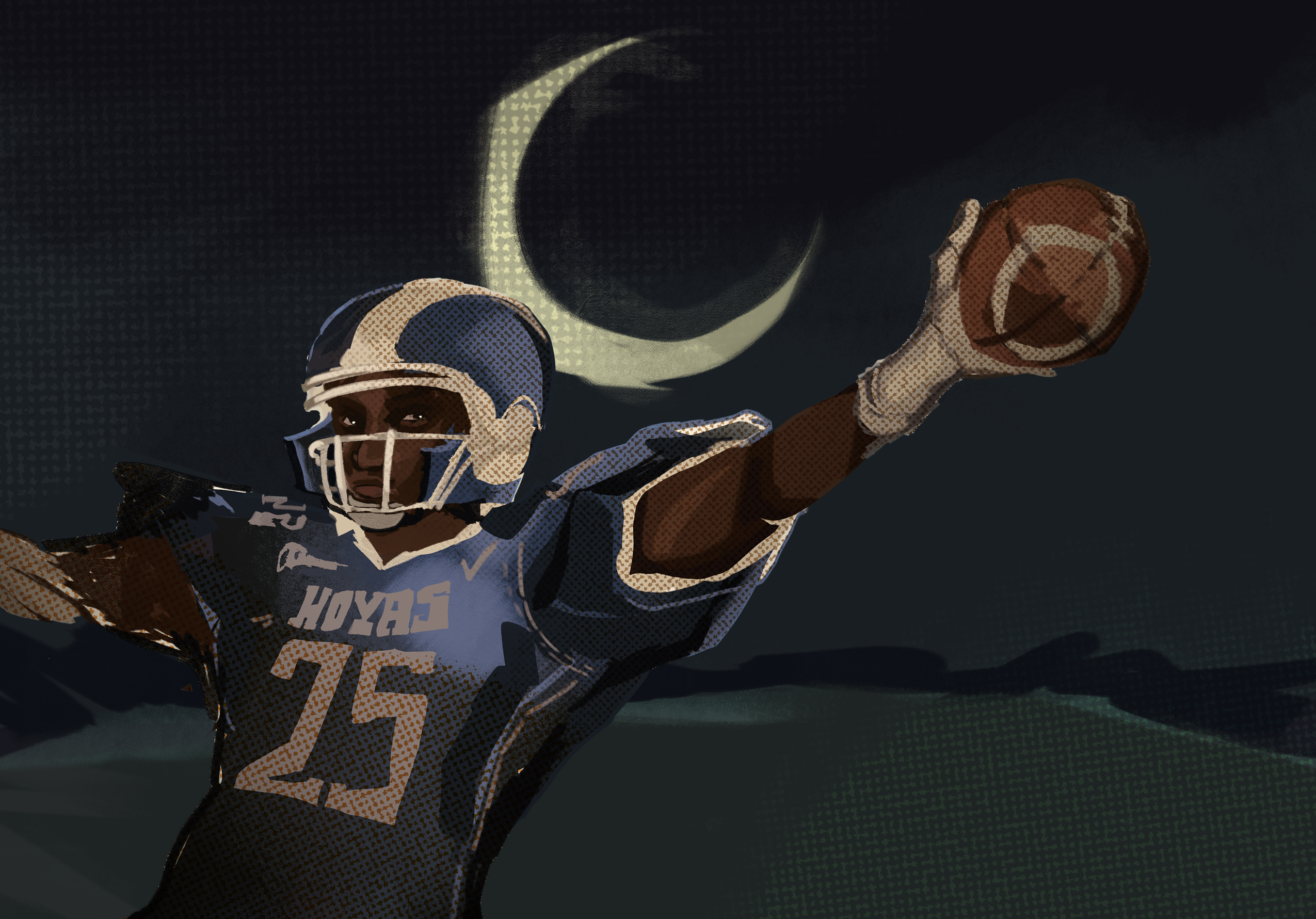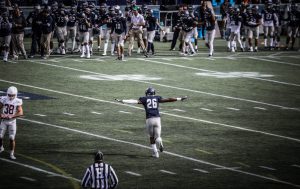On April 10, Muslims around the world celebrated Eid, the holiday that marks the conclusion of the holy month of Ramadan. Ramadan, the ninth month in the Islamic calendar, is marked by the practice of fasting daily from dawn until dusk and is meant to bring Muslims closer to God through the practice of self-restraint, patience, and the cultivation of gratitude.
While fasting, Muslim students experience a complete reworking of their habits and sleep schedules during Ramadan. Fatigue from fasting also makes it challenging to stay alert and focused, making attending class and completing assignments a struggle. When sports are thrown into the mix, there are additional challenges. The Voice sat down with two Muslim athletes on the football team, sophomore cornerback Alpha Barry and freshman defensive tackle Mouhammed Sow, to learn about their Georgetown athletic experience during Ramadan.
A primary struggle of theirs throughout the month was battling dehydration and fatigue during workouts. “Only having a small frame to hydrate from, like, the time we can [drink] to the time I go to bed, it’s not a lot to work with, especially with the amount of water we’re losing during our workouts and practice,” Sow said.
According to them, early morning practices were helpful in addressing this. “Everything’s usually in the morning, that’s what makes it easier,” Sow said, explaining that practices immediately after the pre-fasting meal (suhoor) were more manageable, as energy and hydration levels would be high.
When asked if there was any way Ramadan could be made easier for student athletes, Barry and Sow were honest about the realities of fasting and sports.
“You have to remember, you are a part of the team, and you have your responsibilities to the team,” Barry said. “[Even while fasting,] you’re still a team member and you’re expected to do what everyone else is doing.”
For Muslims, Ramadan is a markedly social experience. Meals for beginning and breaking the fast, suhoor and iftar, in addition to special Ramadan prayers made in congregation, facilitate more community gatherings than usual. During the month, Muslims are also joined by their shared fasting experience in a larger non-Muslim society. For student athletes, this shared experience is especially valuable to overcome the physical demands of athletics.
At Georgetown, there are few Muslim athletes. “I don’t really know any other Muslim athletes besides Alpha,” Sow said. Yet even unity with one is a blessing during Ramadan.
“It’s definitely helpful to have a Muslim teammate,” Barry said. “Even in the morning, just looking at him and being like, ‘Damn. We got this together.’” Barry and Sow mentioned that the two of them were able to push and hold each other accountable throughout the month. As much as the coaching staff and other athletes provided support, there was an element of Ramadan that they simply couldn’t understand. “There were times where I would just look at Mo and we would both laugh during water breaks,” Barry added. Whether it was encouraging each other to keep going or an unspoken understanding of each other, the shared experience of Ramadan was a comfort.
But this solidarity between Muslims during Ramadan is not limited to just immediate communities. Across the globe, there are several Muslim athletes in professional sports, and these icons serve as inspiration during tough Ramadan workouts.
“I think the most comforting thing was, really, seeing Muslims around the world. And I was like, ‘Alright, if they could do it, like, you got it,” Barry said.
“Tuning into the NBA, watching Kyrie Irving have his best games during Ramadan, I go to workouts [in the morning and] I just know I gotta push the best I can, for real,” Sow said.
Muslim unity during Ramadan is crucial to surviving the month and its challenges in a non-Muslim society. But Barry and Sow also found strong support from their non-Muslim teammates and coaching staff, recounting genuine care and concern from them. “My teammates were really understanding,” Barry said. “They would pour water down my back just to help me cool down.”
“I have friends who are non-Muslim just checking in on me, just making sure I’m on point—making sure I’m just getting everything done and being the best person I really could be,” Sow added. He said that coaches would conduct check-ins, asking the athletes how fasting was going and if they were eating and drinking well during the night hours. “The athletic department, for the most part, was as supportive as possible,” Barry said.
Coupled with this support from teammates and staff was a heartfelt desire to learn about Ramadan and Islam. According to Barry, “It was a genuine curiosity, it wasn’t just casual.” The pair shared that teammates would engage in conversation with them, wanting to learn more about Ramadan, asking question after question. According to Barry, some teammates even expressed wanting to come visit the campus mosque to learn more. “You could tell that there was, like, a level of respect amongst each other,” Barry said.
And while Barry and Sow are the only Muslims on their team, they drew motivation and support from the spirituality of their non-Muslim teammates too. “Even though we come from different faiths, a lot of the team likes to practice their faith. I see them take their time to do, like, Bible study on Sundays. That just encourages me to tune into my faith even more, being intentional with what I’m doing, especially during Ramadan,” Sow said.
The month of Ramadan entails a series of challenges for Muslims. In Sow’s words, “It’s gonna be a struggle, athlete or not.” But the month is highly cherished among Muslims as an opportunity to cut out distractions from their life, strengthen their faith, and better themselves both as believers and as people. At Georgetown, Muslim students are able to find support and community, both within the Muslim community and outside it—just as they can find it both on the field and off it, too.







